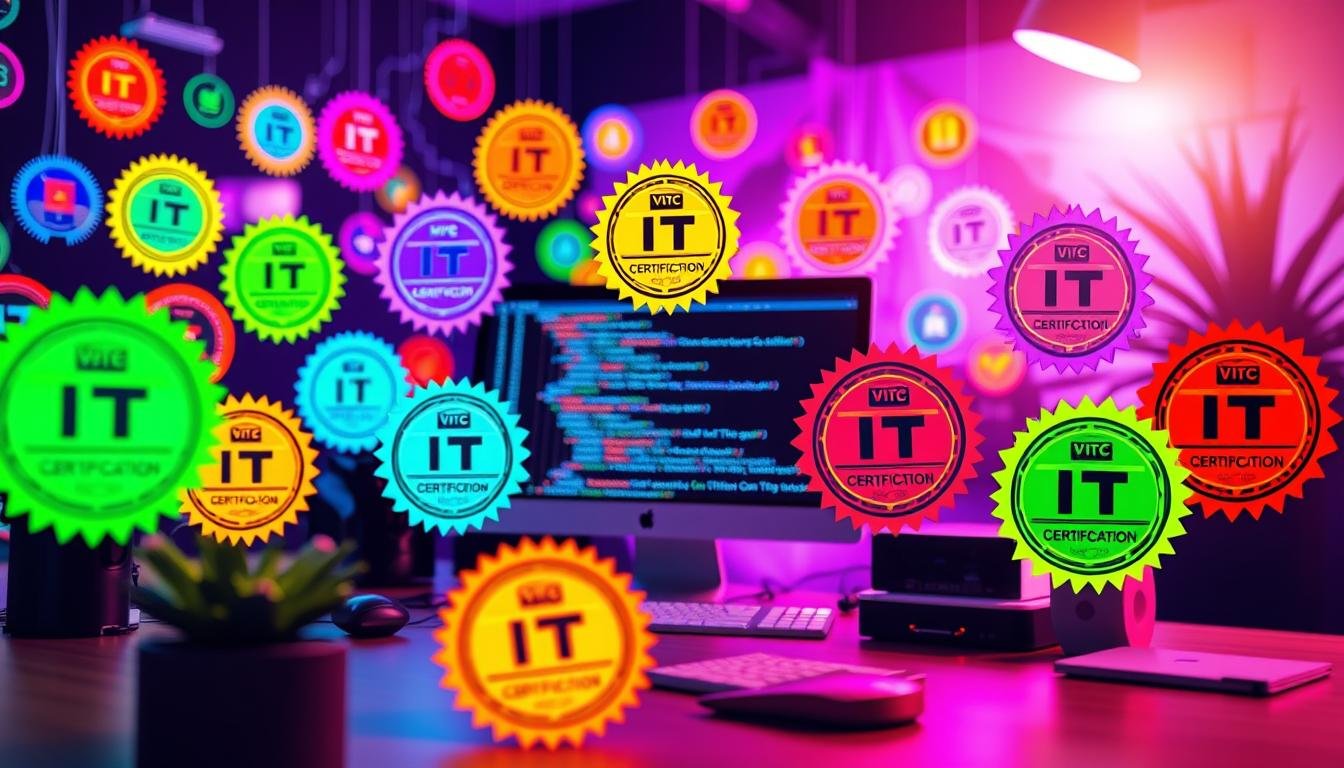Are you poised to ascend your tech career trajectory, yet uncertain about the value of IT certifications? In the rapidly evolving technological sphere, these credentials serve as a pivotal gateway to new vistas in the fiercely competitive employment arena. They affirm your possession of essential technical competencies, broaden your acumen, and signal to employers your dedication to professional growth within the technological domain. The IT sector’s relentless transformation underscores the imperative of acquiring pertinent IT industry certifications for those aiming to thrive in a technological vocation.
As you chart your course through the IT realm, contemplate how these certifications can differentiate you from your peers and align you with the sector’s evolving standards within the United States.
Key Takeaways
- IT certifications validate your technical skills and enhance your knowledge.
- They are crucial for advancing in a competitive tech career.
- Employers increasingly recognize the value of certified professionals.
- Stay informed on the latest certifications to remain competitive in the IT industry.
- Certifications can significantly impact your salary potential and job opportunities.
What Are IT Certifications?
IT certifications are formal credentials that validate an individual’s expertise in various technology fields. These recognitions enhance a professional’s qualifications, serving as a benchmark for skills in domains such as networking, cybersecurity, and cloud computing. A comprehensive overview of tech certifications reveals that organizations like CompTIA, Cisco, Microsoft, and AWS offer certifications tailored to meet industry demands.
Definition and Overview
The definition of IT certifications encompasses a range of qualifications that demonstrate an individual’s capabilities in technology-related areas. By completing required training and passing examinations, professionals earn these certifications. They are critical for anyone aiming to advance their careers, as these credentials help validate proficiency and enhance overall employability.
Importance of Certifications in Tech
The importance of IT certifications cannot be overstated. They play a pivotal role in the job market, often serving as prerequisites for certain positions. For instance, many employers look for IT professional certifications to ensure candidates possess the necessary skills. Certifications not only boost a resume but they also reflect a commitment to ongoing learning in a constantly evolving field. For an overview of entry-level certifications that can launch a career, refer to this resource.
Types of IT Certifications
In the realm of information technology, various certifications serve to differentiate professionals and augment their expertise. Understanding the primary categories of these IT credential types is crucial for individuals aiming to progress in their careers. This knowledge enables them to select the most suitable path for their professional development.
Vendor-Specific Certifications
Vendor-specific IT certifications are crafted to affirm proficiency in specific products or services offered by a particular entity. For instance, the Cisco Certified Network Associate (CCNA) and Microsoft Certified Solutions Expert (MCSE) certifications are highly sought after by IT professionals. These certifications validate an individual’s capability to operate within a particular technological framework, thereby enhancing their employability in sectors utilizing those technologies.
Vendor-Neutral Certifications
Vendor-neutral IT certifications, on the other hand, provide a more comprehensive understanding, applicable across a wide range of platforms and technologies. The CompTIA A+ and ITIL certifications exemplify this category. These certifications are particularly beneficial for those desiring a versatile skill set, capable of being applied in diverse environments. They underscore a foundational proficiency in IT, making them an excellent choice for newcomers to the field or those contemplating a career transition.
Specialty Certifications
Specialty IT certifications, by contrast, concentrate on specific niches within the technology sector. For example, the Certified Ethical Hacker (CEH) certification is geared towards cybersecurity enthusiasts, while the AWS Certified Solutions Architect certification is geared towards cloud computing specialists. These certifications serve to highlight advanced knowledge and skills in particular domains of interest, thereby making candidates more attractive for specialized roles.
Popular IT Certifications in 2023
The rapid advancement of technology necessitates continuous professional development through certifications for a thriving IT career. In 2023, several certifications have emerged as the most prestigious among IT professionals aiming to augment their expertise and career prospects. This segment delves into the prominent IT certifications, encompassing CompTIA A+, CCNA, and CEH.
CompTIA A+
The CompTIA A+ certification is a cornerstone for aspiring IT professionals. It emphasizes foundational skills, addressing critical areas such as hardware, software, and troubleshooting. This certification is particularly beneficial for novices entering the tech sector, solidifying its status as a premier IT certification for 2023. It equips professionals with a comprehensive grasp of fundamental IT knowledge, thereby enhancing their employability and opening doors to more advanced certifications.
Cisco Certified Network Associate (CCNA)
The CCNA certification is another highly esteemed credential. It focuses on networking concepts and infrastructure skills, providing candidates with the capabilities to manage diverse networking environments. The CCNA certification not only showcases technical proficiency but also a dedication to keeping abreast with evolving networking technologies. As networks become increasingly critical for businesses, obtaining a CCNA certification is a strategic career advancement for networking professionals.
Certified Ethical Hacker (CEH)
The CEH certification has gained immense popularity amidst escalating cybersecurity threats. It trains professionals to emulate hackers, empowering them to fortify organizations against cyber threats more effectively. The escalating demand for cybersecurity specialists underscores the significance of acquiring a CEH certification. For those specializing in this critical domain, pursuing this esteemed credential is crucial, solidifying its standing among the popular IT certifications 2023.
The IT certification landscape is in a state of continuous transformation, ensuring professionals possess the requisite competencies for career success. Staying abreast of popular IT certifications such as CompTIA A+, CCNA, and CEH can significantly influence career progression and job opportunities. For those contemplating certification paths, exploring this resource offers valuable insights into lucrative certification options.
How IT Certifications Can Boost Your Career

In the current competitive job market, the significance of IT certifications on career trajectories is profound. For those in the tech sector, these certifications are a reflection of their unwavering commitment and specialized knowledge. This discourse delves into how such qualifications can significantly elevate job prospects and remuneration potential.
Enhanced Job Opportunities
Acquiring IT certifications can unveil a plethora of career avenues. Employers, in their quest for talent, often prioritize candidates with certifications, as they signify verified competencies and knowledge in particular domains. This preference empowers certified professionals to differentiate themselves amidst a multitude of applicants. Companies are in search of individuals who can make an immediate impact, thereby valuing certifications as a crucial factor in the recruitment process.
Higher Salary Potential
The financial advantages of obtaining certifications are substantial. Certified professionals generally command higher salaries compared to their non-certified counterparts. Extensive research has underscored the remunerative benefits certifications bring; individuals holding multiple certifications may witness even more pronounced salary increments. The tech industry, in its recognition of certified expertise, demonstrates the high regard such qualifications command in the marketplace.
The Process of Earning IT Certifications
The acquisition of IT certifications can profoundly elevate one’s professional trajectory. The inaugural step necessitates the selection of certifications that resonate with one’s vocational ambitions and personal inclinations. An assessment of the prevailing demand for particular competencies within the sector is imperative prior to making a definitive choice.
Choosing the Right Certification
In the selection of IT certifications, several variables must be scrutinized, including prevailing industry trends, individual interests, and prospective career objectives. An exhaustive investigation into various certifications is essential to identify one that aligns with your goals and augments your professional prospects.
Study Resources and Preparation Tips
Upon the selection of a certification, the subsequent phase entails the acquisition of requisite study materials. An effective strategy for certification exam preparation encompasses:
- Online courses provided by entities such as Coursera or Udemy
- Comprehensive texts that delve into critical subjects
- Practice exams to acquaint oneself with the examination structure
Formulating a personalized study regimen, tailored to one’s learning modality, is indispensable. This entails the establishment of dedicated study periods and the segmentation of material into digestible portions. Such a methodical approach fosters confidence and readiness as the certification examination draws near.
Best Practices for Certification Exam Preparation

The process of preparing for an IT certification exam necessitates a multifaceted strategy aimed at optimizing success probabilities. Adherence to these preparation guidelines enables candidates to adeptly allocate study time and assimilate critical content.
Creating a Study Schedule
Establishing a meticulously planned study schedule is paramount for effective time management and comprehensive coverage of exam topics. Begin by delineating the exam objectives into discrete, manageable segments. Allocate dedicated time slots for each segment, taking into account your individual strengths and areas requiring improvement. The importance of consistency cannot be overstated; strive for consistent daily study sessions, interspersed with brief intervals to preserve concentration. Regular review of the material is crucial for solidifying knowledge and enhancing retention.
Utilizing Online Forums and Study Groups
Participation in online study groups can profoundly augment your learning journey. These communal platforms facilitate the exchange of resources, insights, and practice questions among peers. Engagement in IT forums dedicated to certification can offer supplementary support, aiding in the resolution of ambiguities and providing varied viewpoints on complex subjects. Interactions with fellow aspirants can serve to reinforce your understanding and bolster your confidence as the exam approaches.
For those seeking to augment their resources, exploring specialized content pertinent to your certification can prove advantageous. Consider incorporating principles from sources such as certification exam preparation tips to enhance your study methodology.
Common Misconceptions About IT Certifications
The realm of IT certifications harbors several misconceptions that can sway career choices. It is imperative to debunk these myths to ensure that aspiring professionals make well-informed decisions regarding their educational and training pursuits.
Certifications vs. Experience
The notion that IT certifications can entirely supplant hands-on experience is a widespread misconception. While certifications imbue theoretical knowledge and can bolster one’s resume, they cannot substitute for the practical skills acquired through real-world application. Employers frequently seek candidates who possess a harmonious blend of IT experience vs. certifications. They value the practical expertise gained in actual settings, rendering experience indispensable for success in the tech sector.
The Cost of Certifications
Another prevalent myth concerns the perceived costs of IT certifications. Many believe that acquiring these credentials necessitates a significant financial outlay. However, numerous affordable pathways exist, including scholarships and free study materials, which significantly reduce entry barriers. With diligent research, candidates can attain valuable certifications without incurring substantial financial burdens. For further insights on cost management, refer to this resource.
Maintaining Your IT Certifications
In the swiftly advancing realm of technology, the upkeep of IT certifications is paramount for professionals. It is imperative to remain abreast of the ongoing education mandates set forth by various certification bodies to ensure the validity of these credentials.
Continuing Education Requirements
Renowned entities, such as CompTIA and Microsoft, have delineated precise stipulations for continuous learning. These mandates underscore the significance of acquiring and retaining knowledge and competencies aligned with the latest industry developments and technological advancements. Professionals can typically meet these obligations through:
- Formal courses and workshops
- Conferences and seminars
- Webinars to gain insights into emerging technologies
- Professional development activities
Renewal and Recertification Processes
The renewal of IT certifications is subject to variation, contingent upon the certifying entity and the specific certification in question. Some necessitate a re-examination, whereas others permit the accumulation of Continuing Education Units (CEUs) as a pathway to recertification. Grasping these recertification processes is crucial for the uninterrupted maintenance of IT certifications.
IT Certifications and Career Advancement
In the rapidly evolving technological landscape, networking within the IT sector profoundly influences one’s professional trajectory. IT certifications not only affirm your proficiency but also serve as a conduit for networking, thereby catalyzing career progression. Engaging with peers who hold similar certifications cultivates relationships that may evolve into mentorship, employment opportunities, and insights into prevailing industry trends.
Networking Opportunities
Engagement in conferences, seminars, and digital forums facilitates interactions with seasoned professionals and innovators. These arenas provide a venue for the exchange of ideas and experiences, thereby enhancing your professional stature. The connections forged through diligent networking can unveil opportunities that propel your career forward, underscoring the importance of a robust network for those aspiring to ascend the tech industry’s hierarchy.
Transitioning to Advanced Roles
Certifications act as a springboard for those aspiring to ascend to more complex tech roles. Possessing validated expertise in specific areas renders individuals more appealing to employers in search of qualified candidates for roles such as IT manager or cybersecurity analyst. Demonstrating a commitment to ongoing learning positions you as a highly sought-after candidate, poised to assume more substantial responsibilities. Achieving career progression through certifications facilitates a seamless transition into these demanding positions.
Future Trends in IT Certifications
The evolution of IT education heralds a pivotal shift towards hybrid learning models in tech education. This paradigm integrates online coursework with in-person training, fostering a flexible and dynamic learning environment. It caters to diverse learning preferences, enabling individuals to acquire essential knowledge and skills. The integration of online resources with hands-on experiences enhances comprehension of intricate concepts, preparing professionals for the collaborative demands of contemporary tech environments.
The Rise of Hybrid Learning Models
The escalating demand for cybersecurity certifications mirrors the intensifying cyber threats against organizations and individuals. This necessitates a workforce equipped with the expertise to safeguard critical assets and manage security incidents effectively. Consequently, certifications such as the Certified Information Systems Security Professional (CISSP) and CompTIA Security+ are gaining traction, underscoring the *evolving IT certification landscape*. For those aiming to transition into or advance within cybersecurity, these certifications are indispensable for career progression.
Increasing Demand for Cybersecurity Certifications
Staying abreast of these evolving trends is imperative for IT professionals. Grasping the future trajectory of IT certifications, encompassing the adoption of hybrid learning and the escalating importance of cybersecurity, empowers individuals to make strategic educational choices. As the tech sector confronts new challenges, aligning with these trends can unlock promising career prospects and a significant competitive advantage.

